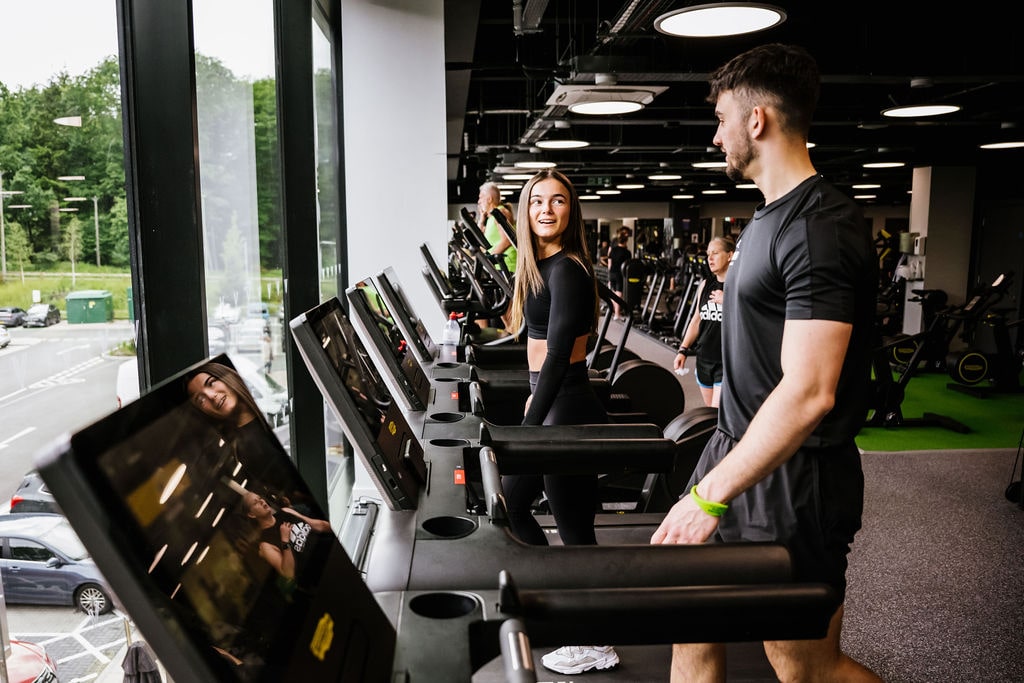The majority of people begin their journey with exercise focussed on physical goals such as losing weight, toning up or improving their strength and endurance.
But once those goals are achieved, the main reason people continue to maintain a fitness routine is because of the amazing way it makes them feel.
Physical activity has a huge potential to enhance our overall well being and improve our mental health. We take a look at how introducing exercise alongside other healthy habits will help to keep your head happy...
Move It, Move It
The body likes to move. Trust us, it’s what keeps it performing at its best! Being active increases blood flow around the body, including the flow to the brain. By getting in your daily exercise, this blood flow prevents the body from getting sluggish, giving us better focus, concentration and positive thoughts. Exercise encourages the body to release the happy hormones, endorphins. The more often you exercise, the longer the effects last.
A Dose of Vitamin D
Spending time in the great outdoors not only lifts the mood by ensuring you get plenty of fresh air, but it also encourages the body to produce vitamin D when exposed to the bright sunlight. Plenty of vitamin D makes us feel happier, more alert and sparks the positivity signals in our brains. Keep up with some walks and reap the rewards!
Soothe The Soreness
Aches and pains caused by hunching over a desk all day can bring on a little crankiness. Throw in that dining chair in place of your usual comfy office chair and the body has every reason to feel a little tense!
Exercise will help to stretch out those muscles that have been contorted up over that computer all day, and give the body a boost of energy, in turn, making you feel more alert.
A Spot Of Me Time
Sometimes, we all need a little space to reflect on the day and relieve our own stresses. Exercising alone is a great way to get some quiet time, assess where the stresses stem from, and how best to tackle them! Try a relaxing pilates class, yoga, tackle an upbeat HIIT class or get your kicks with BodyCombat to take out some tension.

Avoid Stimulants
Easier said than done, of course, but anything that can be done to reduce stress should be tried. The main stimulants people face are caffeine and high intakes of processed sugar. Both of these stimulate a stress response on the body but it’s so easy to become dependent on these things - after all, if your tank is running on empty, you’ll want the quickest & easiest fix to perk you up again!
Try and swap a coffee for a herbal tea, and avoid drinking coffee past noon, as caffeine can stay in your system for up to 12 hours.
Try and stick to natural sugars and eat smaller amounts if possible. Slower digesting carbohydrates may help with this, and generally meals with higher amounts of fibre and protein will be more filling and cause a lower cortisol response on the body.
You need a mixture of soluble & insoluble fibre. Processed foods only contain soluble fibre, whilst vegetables contain both. Vegetables are also good for nourishing the body.
Optimise Your Bedtime Routine
Before bedtime should be when your body wants to shut down and be in a fully resting state. Many things can stop this from happening, meaning poor quality of sleep and therefore resulting in next day symptoms like grogginess, lack of concentration, tiredness & fatigue.
Ensure you’re not exposed to blue light 45 minutes before bedtime, as this stimulates cortisol and reduces levels of melatonin (sleep hormone). This means phones away, and TVs out of bedrooms!
Do not eat up to 2-3 hours before bedtime, as this causes stress on your digestive system and can affect sleep quality.
Enjoy a bath with magnesium salts. A cup of these salts in your bathtub will induce a level of relaxation on your muscles that will aid overall relaxation going into night time. This is especially useful if you’ve been to the gym!
New Form Of Relaxation
Maybe try yoga or meditation to induce a relaxed state. You need to find what helps you to turn off mentally, and by that we mean: think about what activity makes you lose track of time, without raising your heart beat too much.
It can be walking, cleaning your car, or perhaps playing an instrument. Try and incorporate this as much as possible, for at least 20 minutes, 2 - 3 times a week. When you are able to find what makes you relax, it should help induce parasympathetic system dominance and aid relaxation in the body.

Cut The Cortisol
Similarly, regular workouts will help to lower the amounts of stress hormones, Cortisol and Adrenalin within the body, making you feel more relaxed.
Swap out the unhealthy habits we rely on as coping mechanisms. Rather than reach for a strong coffee, a little tipple or take it out on your nearest and dearest, get your fitness kit on and start moving!
It doesn’t matter what kind of exercise you're doing. Take a run, accompanied by your favourite playlist (a few tips on that in our blog). Tackle a group fitness class with friends, or take to the great outdoors... it all counts towards the feel good factor!
For those with friends who claim they are ‘too stressed’ to exercise, you may wish to share this with them!
Social Sweat Session
Working out with others not only helps you to feel more motivated, you're likely to perform better and for longer.
The feel-good hormones that come from working out with friends and family act as natural stress relievers, whilst the excitement of hitting your goals together will only boost the rush further.
Bring a buddy on board your fitness journey and take advantage of our current ‘Refer a friend’ offer.
Grab the kids and head into club for a fun filled family swim session or give your teens some much needed digital downtime with our discounted gym memberships for 14 years+.
Let the feel-good vibes commence!



